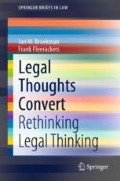Abstract
Indeed, a flow of information is like the life-ensuring breath we take in the woods, at the seashore or in the centre of our town. Those experiences vary with their surroundings and in particular with the other people creating spaces and thoughts. The jurist’s situation is not different, as this Brief suggests, and a first chapter on legal thinking unfolds. Continuity is the main feature of conversion; conversion the climate of re-thinking law. Attention pertains to the person who originates thoughts and ideas, and in his or her ingenuity needs other persons and institutions, norms and values as well as the drive to share what comes to the fore. Legal thoughts are thus unfolding and in this activity they convert. They do not simply add to what is there: their adding is not only a sharing but always also a conversion. Upcoming thoughts in law are not solely the result of what law students or judges, politicians or legal scholars have in mind: they do mainly stem from social experiences and existing thought patterns that are converted already in to law. Legal thoughts demonstrate simultaneousness and even entanglements rather than ordered chains of concepts and ideas. This is mirrored in the first chapter of this Brief—the multiple consequences of the gap between rule and reality with which the jurist is confronted. They determine his or her social position as well as the variety of theoretical viewpoints, so that interaction among them is needed and affectivity a requirement to bring converting legal thoughts to the fore.
Access this chapter
Tax calculation will be finalised at checkout
Purchases are for personal use only
Notes
References
Dewey, J. (1924). Logical method and law. Cornell Law Quarterly, 10(1), USA.
Dworkin, R. (2008). Justice in robes. Cambridge, USA: Harvard University Press.
Dworkin, R. (2011). Justice for Hedgehogs. Cambridge, USA: Harvard University Press.
Fleerackers, F. (2000). Affective legal analysis. Berlin: Duncker & Humblot, BRD.
Frank, J. (1930). Law and the modern mind. New York: Brentano, (20092) Oxfordshire, UK: Transaction/Routledge.
Fuller, L. (1958). Positivism and fidelity to law—A reply to professor Hart. Harvard Law Review, 71, Harvard, USA.
Fuller, L. (1964). The morality of law (revised ed. 1965). New Haven, USA: Yale University Press.
Hart, H. L. A. (1958). Positivism and the separation of law and morals. Harvard Law Review, 71, Harvard, USA.
Holmes, Jr., O. W. (1897). The path of law. Harvard Law Review, 10(8), Harvard, USA.
Kozinski, A. (1993). What I ate for breakfast and other mysteries of judicial decision making. Loyola of Los Angeles Law Review, 26, 993, Los Angeles, USA.
Llewellyn, K. (1930). The bramble bush: On our law and its study, (20092) Oxford, UK: Oxford University Press.
Llewellyn, K. (1960). The common law tradition: deciding appeals. Brown, Hachette Book Group, New York, USA: Little.
O’Brien, D. (2012). Judges on judging: Views from the bench (4th ed.). London, UK: Sage.
Posner, R. (2008). How judges think. Cambridge, USA: Harvard University Press.
Scalia, A. (1984). Originalism: The lesser evil. Cincinnati Law Review, 57, 849, USA.
Schauer, F. (2009). Thinking like a Lawyer. Cambridge, USA: Harvard University Press.
Sunstein, C. (2001). One case at a time. Cambridge, USA: Harvard University Press.
Tribe, L. (1985). God save this honorable court. New York, USA: Random House.
Waelkens, L. (2015). Amne Adverso: Roman legal heritage in European culture. Leuven University Press.
Author information
Authors and Affiliations
Corresponding author
Rights and permissions
Copyright information
© 2020 The Author(s), under exclusive license to Springer Nature Switzerland AG
About this chapter
Cite this chapter
Broekman, J.M., Fleerackers, F. (2020). Legal Thinking. In: Legal Thoughts Convert. SpringerBriefs in Law. Springer, Cham. https://doi.org/10.1007/978-3-030-43517-2_2
Download citation
DOI: https://doi.org/10.1007/978-3-030-43517-2_2
Published:
Publisher Name: Springer, Cham
Print ISBN: 978-3-030-43516-5
Online ISBN: 978-3-030-43517-2
eBook Packages: Law and CriminologyLaw and Criminology (R0)

